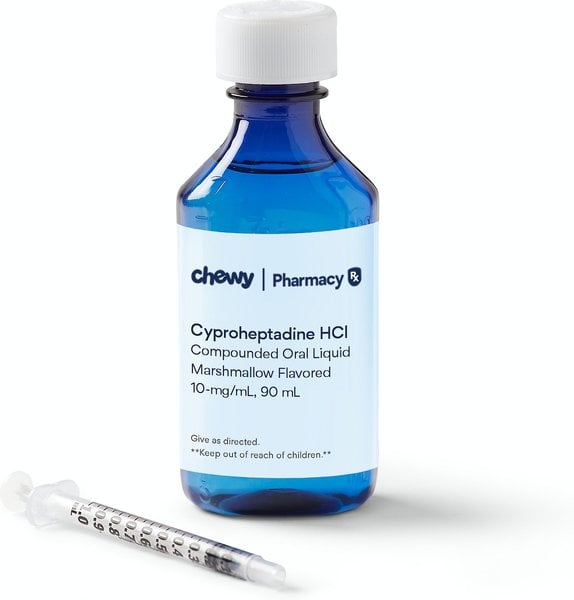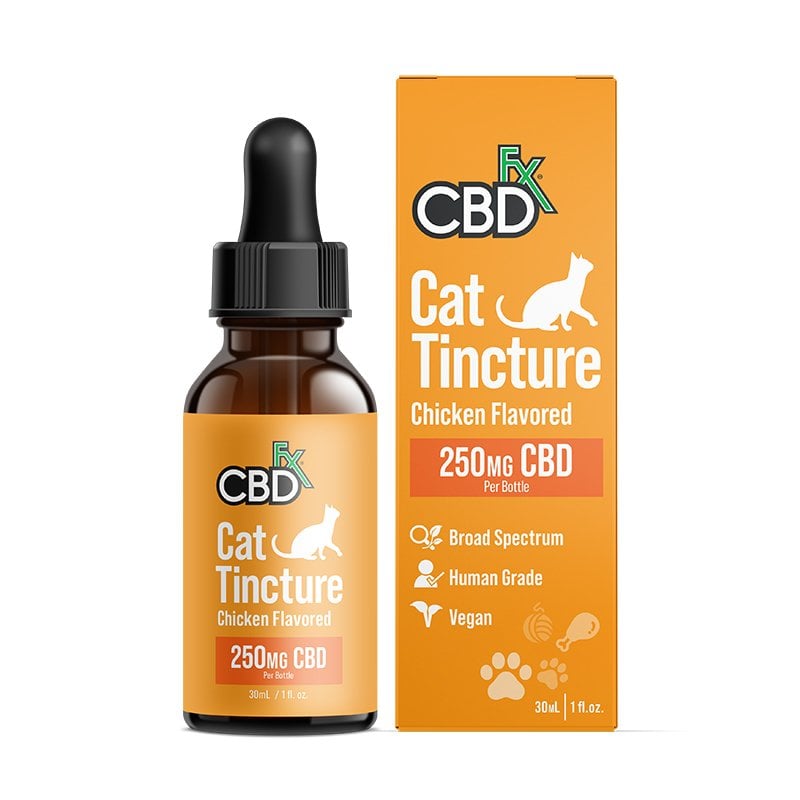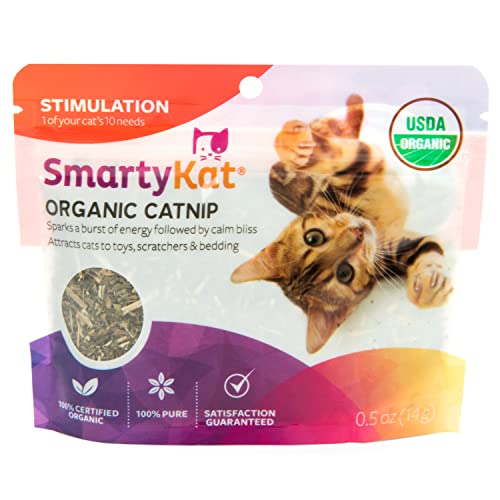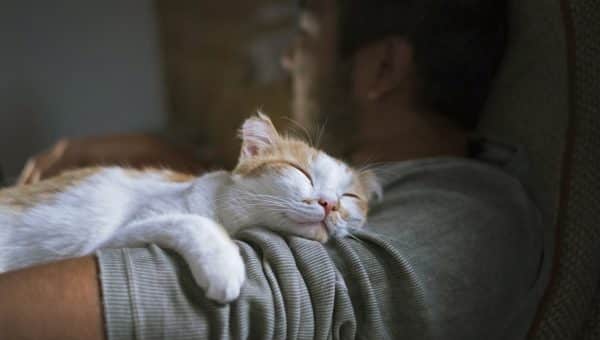- This post contains affiliate links. Read more here.
- Not a substitute for professional veterinary help.
My cat Peaty has a remarkable ability to tell time—dinner time, that is. At roughly the same hours every day, he becomes vocal in requesting his meals. This regularity and insistence is found in many cats, and it’s part of why we love them. It’s also what can make a cat’s sudden lack of appetite so jarring.
Cats stop eating for a variety of reasons, many of which are related to their emotional and physical health. Some cats are also just picky. Either way, when a cat doesn’t eat for 24 hours or more, experts recommend a trip to the vet to identify the cause and rule out any underlying health problems.
One thing that can help as you and your vet investigate is cat appetite stimulants.
Cat appetite stimulants come in a variety of forms. The most common and most powerful are prescription medications from a veterinarian, though at-home and over-the-counter options like supplements and meal toppers can be useful as well. Your veterinarian can help you determine which option is best suited to your cat’s medical situation.
To get you started, we’ve rounded up a few of the best appetite stimulants for cats—and we’re hoping you and your kitty get back on schedule in no time.
Prescription Appetite Stimulants for Cats
When you cat needs medical intervention to get them to eat, these products may be on your veterinarian’s shortlist.
Best Overall Prescription Appetite Stimulant for Cats: Mirataz Mirtazapine Transdermal Ointment
Mirtazapine was originally developed as an anti-depressant for humans but is now one of the leading appetite stimulants for cats. It’s been found to reduce nausea and increase appetite in felines, and it’s available in pill, liquid, or—in the case of Mirataz—ointment form.
For many cat parents, topical application is a big plus; after all, a cat who isn’t eating their normal food isn’t going to find swallowing a pill any easier. Plus, Mirataz is well-tolerated by most cats, with drowsiness as the most common side effect.
Notable details:
- FDA-approved
- Administered externally; a 1.5″ length of ointment is applied to the ear once daily
- Each box includes a 14-day supply
- Available by prescription only
Potential risks and concerns:
- Possible side effects include drowsiness, “seratonin syndrome” (too much serotonin in the body), and, rarely, changes to bone marrow
- May interact with other medications, including MAOIs and SSRIs
- Should be used with caution in cats with liver or kidney disease or with a history of blood diseases, including feline leukemia
Best for Cats with Kidney Disease: Elura Capromorelin Oral Solution
Weight loss and lack of appetite are two of the symptoms of kidney disease in cats, a condition that’s often long-term. Good nutrition is critical for these cats, and Elura was specially designed to help them get back to mealtime by mimicking the natural hunger hormone ghrelin. The liquid solution is vanilla-flavored, administered by syringe, and intended for both daily and long-term use.
Notable details:
- Specially geared toward cats with chronic kidney disease
- Minimal known interactions with other medications
- Available by prescription only
- FDA-approved
Potential risks and concerns:
- Common side effects include vomiting and increased saliva production, and seem to occur more often in male cats
- Should be used with caution in kittens under five months old and cats that are pregnant, nursing, or have cardiovascular disease, as it often lowers blood pressure for a while after use
- While drug interactions aren’t specifically known, all medications and supplements should be disclosed to your vet before use
Best for Cats with Allergies: Cyproheptadine Compounded Oral Liquid
Before mirtazapine hit the market, cyproheptadine was often veterinarians’ go-to for cat appetite stimulants. Cyproheptadine comes in both liquid and pill form, including tuna-flavored chewable tablets.
It works primarily as an antihistamine—making it a good choice if allergies are causing or accompanying your cat’s mealtime malaise—but is effective in increasing appetite as well, with minimal side effects.
Notable details:
- Liquid compound allows for precise dosage and is administered orally with a syringe
- Available by prescription only
- May help feline asthma and allergies in addition to appetite
- Can be prescribed for serotonin syndrome (a potential side effect of mirtazapine)
- Chewy’s version comes in four flavors: chicken, tuna, beef, and marshmallow
Potential risks and concerns:
- Should be used with caution (or avoided) for geriatric, pregnant, and nursing cats
- May interact with a number of other medications and supplements
- Dry mouth and drowsiness are common side effects—some cats may become excitable instead
Non-Prescription Cat Appetite Stimulants to Help Your Cat Eat
While a qualified professional should always evaluate a cat who isn’t eating, not every cat needs medication to solve the problem. If your cat’s lack of appetite is caused by emotional distress (as from traveling or moving) or because your cat is simply being a cat, these products may help.
Best CBD Oil to Encourage Your Cat’s Appetite: CBDFX Cat Tincture
Cannabis, the plant from which cannabidiol (CBD) oil is derived, has a reputation for causing the munchies in humans, and it may have an impact on cats’ appetite as well. Proponents of CBD oil for cats say that it reduces inflammation, including in the gastrointestinal tract and bowels, and offers calming effects.
The oil may help to reduce symptoms for cats suffering from gut irritation, nausea, or anxiety, naturally making food more appealing. This particular CBD oil is not only made with human-grade ingredients, but features a tantalizing chicken flavor. It’s a good idea to check with your vet before offering your cat CBD.
Notable details:
- Plant-based, human-grade formula
- Lab-tested for safety and quality
- Available without a prescription
- Dual benefits of calming and inflammation reduction
- Can be put on food at mealtime or administered orally
Potential risks and concerns:
- While CBD seems to be safe for cats, production is largely unregulated and there are risks to using it
- CBD may only solve part of the problem, or it may not be the best option for your cat—consult your vet before using
Best Herbal Remedy: SmartyKat Organic Catnip
Catnip has a remarkable effect on many cats, turning typically docile creatures into zany (and hilarious) little monsters. It may surprise you to learn that cats can actually eat catnip. This is promising for your food-averse kitty, as sprinkling just a bit of dried catnip over their food may spark their interest enough to entice them to eat.
That said, only about half of cats actually respond to catnip (despite public opinion), and eating too much of it may lead to an upset stomach—so you want to be careful with the dosage.
Notable details:
- All natural and organically grown
- For best effect, squeeze the dried catnip in your hand to release the oils
- Easy to use; just sprinkle the catnip on your cat’s meal
- Widely available; pick some up at almost any pet retailer
Potential risks and concerns:
- Ingesting too much catnip may cause stomach upset—and subsequent lack of appetite—in your cat
- Not all cats respond to catnip, particularly young cats, and the scent may not produce the desired response
- As with CBD, catnip may only solve part of the problem without veterinarian input
Best Food Topper: Solid Gold Bone Broth Meal Topper
Sometimes, cats are just finicky. Adding a new—and more interesting—food to their bowl may help to reignite their passion for mealtime. But you don’t have to necessarily overhaul your cat’s entire nutritional plan to get them to eat. A meal topper can make even boring old kibble more enticing.
Plus, bone broth meal toppers add additional moisture to your cat’s diet, which is important for their overall health. Reviewers rave about this bone broth meal topper, since it comes in easy-to-serve pouches and features pieces of real tuna in a thick pudding-like broth.
Notable details:
- Appropriate for cats of any age
- Grain- and gluten-free for a focus on high-quality, cat-friendly ingredients
- Each three-ounce packet can be resealed and refrigerated for up to three days
- No risk of medical interactions or side effects
Potential risks and concerns:
- To keep your cat healthy, be sure to balance out the added calories from the meal topper
- Consult your veterinarian if the issue doesn’t resolve
How We Chose
The cat appetite stimulants featured here were selected based on a comprehensive look at customer reviews across a wide variety of retail platforms and interviews with veterinary experts. We evaluated appetite stimulants based on their effectiveness, side effects, range of application/ingestion options, and cat appeal. We’re also guided by the experience of living and playing alongside our own much-loved and strongly opinionated cats, who are never stingy with their feedback.











